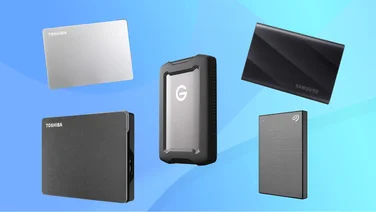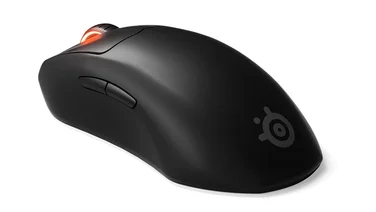To help us provide you with free impartial advice, we may earn a commission if you buy through links on our site. Learn more

- Portability
- Performance
- Price
- … Possible thermal throttling
The higher speed benefits of choosing an external SSD over an external hard disk are obvious, but don’t forget that they can be a lot more compact as well. The PNY Pro Elite is a perfect example of how pocket-friendly SSDs can be: it’s barely thicker than the average smartphone and is even less wide than a credit card.
PNY Pro Elite review: Features
This drive is a faster, higher-capacity relative of the PNY Elite, and it proudly derives its speeds from the USB3.1 interface. USB2 and USB3 are both backwards-compatible, but throughput will be more limited. It’s not a full-on Thunderbolt 3 SSD like the Samsung X5, but that’s fine, as standard USB3.1 ports are more common on PCs and laptops. You have a choice of how to connect, too, as both full-size Type-A and smaller, reversible Type-C cables are included.
In any case, PNY is making some bold claims about how quickly the Pro Elite can run. The quoted read speed of 890MB/s and write speed of 880MB/s are both aiming high; for comparison, the USB3.1-based Samsung T5 only claimed to max out at 540MB/s. The T5 is also a tiny, curved-edge portable SSD, so we were interested to see how the two would square up.
PNY Pro Elite review: Performance
In the first and easiest of our benchmarks, CrystalDiskMark’s sequential test, the Pro Elite took a commanding lead with a 741MB/s read speed and 692MB/s write speed; the T5’s respective results of 554MB/s and 514MB/s are relatively well behind.
There’s a bit of bad news in that the Pro Elite doesn’t reach its advertised maximums, an otherwise common occurrence in this particular test. Even so, the fact that its top speeds are so much higher than the T5’s – which was a fast SSD to begin with – is more cause for celebration than concern.

Unfortunately, performance promptly went off a cliff in the 4K random test. Recording a read speed of 79MB/s and a write speed of 69MB/s, the Pro Elite was only a fraction as capable as the T5 of maintaining pace in this tougher benchmark. Samsung’s drive read at 299MB/s and wrote at 203MB/s, and even the budget Adata SD600Q was faster as well, with 98MB/s and 92MB/s.
With CrystalDiskMark providing mixed messages, we switched to our own, less synthetic file transfer tests. It didn’t take long for the Pro Elite to redeem itself, averaging an exceptional 655MB/s read speed in the huge file test, and while its write result of 440MB/s was less dramatically excellent, both figures still put PNY’s drive comfortably ahead of Samsung’s. The T5 managed a 457MB/s read speed and a 367MB/s write speed, both of which are good for an external SSD, but the Pro Elite is a few steps ahead.
In the large files test, the Pro Elite came out on top again with a 590MB/s read speed and a 424MB/s write speed. The Samsung T5’s respective scores were 456MB/s and 359MB/s, so the gap narrows somewhat, especially on read speeds, but the Pro Elite remains clearly faster, despite using the same USB3.1 interface.
To the T5’s credit, it snatched a victory in the small files read test: its 333MB/s average is a much more comprehensive beating of the Pro Elite’s 266MB/s than previous results would suggest. The latter was faster in the write test, however, with 319MB/s to the T5’s 288MB/s.
In the end, it almost doesn’t matter that the Pro Elite doesn’t run as quickly as it says on the box. It’s repeatedly much quicker than its main competitor, and the only compromise it seems to make in the process is becoming very hot; not that there’s any particular reason to fret about touching an external SSD while it’s connected, anyway. Thermal throttling might help explain its 4K random results, but we wouldn’t say there’s much evidence of it elsewhere.
The Pro Elite is also cheaper than the T5, across all three of its capacity options. The 250GB model works out at 26p per gigabyte, the 500GB model at 16.2p and the 1TB model – the one we tested – at 12.5p.
Respectively, that’s 4.6p, 1.2p and 2.8p cheaper than the equivalent T5 capacities. Samsung’s drive has one advantage in having a 2TB model as well, so this specific model might appeal more to creative users or gamers, but the Pro Elite is better value for each shared capacity. That’s especially impressive as the T5 has had years to drop in price, but the Pro Elite is brand new.
PNY Pro Elite review: Verdict
On top of all this, the Pro Elite comes with a free activation code for Acronis’ True Image data protection and backup software. Not that it needs freebies to be a good deal: this is a wonderfully quick, extremely portable SSD at a very reasonable price.







